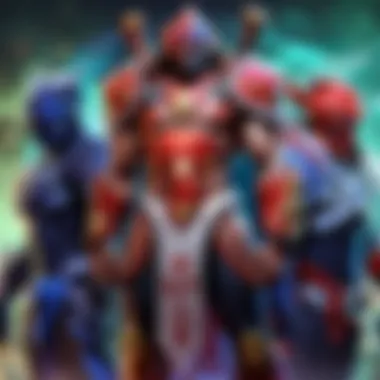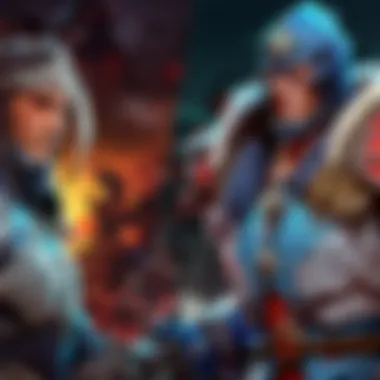Mastering Team Integration in Esports: A Guide


Intro
The esports scene has evolved significantly over the past decade, transforming from a niche hobby into a globally recognized competitive arena. For aspiring players, understanding how to join a team is crucial. Team integration requires more than just individual skill; it involves strategic networking, skill development, and a nuanced understanding of game dynamics, particularly in communities like Dota 2.
Navigating this competitive landscape may seem daunting, but there are structured pathways any individual can follow to enhance their chances of success. This guide aims to dissect the various aspects involved in entering the esports scene, placing particular emphasis on Dota. By examining skill requirements, community involvement, and team dynamics, readers will gain a clearer insight into how to effectively position themselves within this vibrant ecosystem.
Understanding Esports Teams
Understanding esports teams is fundamental for anyone aspiring to enter the competitive gaming scene. In this section, we explore the critical aspects that define how these teams function. Knowing the ins and outs of team structures can help players identify where they fit in and what is expected of them.
The Structure of Esports Teams
Esports teams generally consist of several key roles, each contributing to the overall success of the group. At the core, most teams have players, coaches, analysts, and support staff. Players are typically divided into main roles depending on the game being played. For example, in Dota 2, a typical roster might include a carry, mid-laner, off-laner, support, and hard support. Each role is specialized and requires distinct skill sets, making it essential for aspiring players to understand where their strengths lie.
The hierarchical structure can vary among teams. In some organizations, the coach plays a central role in strategy and decision-making, while in others, player autonomy is emphasized. Recognizing these differences can guide new players in selecting teams that align with their gaming philosophy and approach.
Roles and Responsibilities within Teams
Every individual in an esports team has specific responsibilities. The carry, for instance, focuses on dealing damage and securing objectives late in the game, while the support players manage resources and protect their teammates. Coaches are responsible for developing strategies and enabling communication among team members.
• Players must practice their skills regularly, ensuring they can perform under competitive conditions. • Coaches need to analyze opponents and provide constructive feedback. • Analysts study game footage to identify strengths and weaknesses.
Understanding these roles clarifies what is required from each member, and helps create a culture of accountability.
The Importance of Team Dynamics
Team dynamics play a pivotal role in the success of any esports organization. Communication and collaboration are essential for fostering an environment where players can perform at their best. Teams that prioritize open dialogue tend to adapt more quickly to changing situations in matches. This adaptability can define victory or defeat.
Factors influencing team dynamics include:
- Trust: Members must rely on each other, especially during high-pressure situations.
- Respect: Valuing each other's input contributes to a more cohesive unit.
- Conflict Resolution: Differences will arise. Addressing these issues promptly can strengthen the team.
Assessing Personal Interests and Skills
Entering the esports scene requires a clear sense of direction. Assessing personal interests and skills is crucial for aligning one's ambitions with the competitive landscape of esports. This evaluation not only guides individuals in choosing the right role but also helps in identifying areas for improvement. By understanding what you enjoy and where you excel, you set a strong foundation for your esports career.
Identifying Your Preferred Role
In the esports world, roles are diverse. Common positions include player, coach, analyst, or content creator, each with its own set of responsibilities and expectations. It is essential to reflect on personal interests to find a suitable fit. Consider your affinity towards specific games, gameplay styles, and teamwork dynamics. Dota 2, for instance, presents various gameplay roles such as carry, support, or offlane. Identify which of these roles resonate with your gaming style.
- Reflect on Enjoyment: Ask yourself what aspects of gaming captivate you most. Do you thrive in high-pressure situations, or do you prefer strategic planning?
- Analyze Your Engagement: How do you react to various roles during gameplay? Do you often take charge or prefer to support others?
- Experiment: Play different roles in casual matches to see which ones feel the most comfortable and enjoyable.
Evaluating Your Skills and Experience
Once you have a clearer picture of your preferred role, focus on evaluating your skills and experience. This step helps in understanding your readiness to enter a competitive setting. Skills in esports are not just about in-game mechanics; they also include communication, teamwork, and leadership.
- Game Mechanics: Assess your proficiency in the game mechanics related to your chosen role. Are you comfortable with the characters or champions? Do you possess a deep understanding of strategies?
- Previous Experience: Look back at your gaming journey. Have you played in teams before? Participated in tournaments? These experiences can provide insight into your competitive capability.
- Feedback from Peers: Engage with fellow gamers or coaches to gain external perspectives on your strengths and weaknesses.
By systematically assessing personal interests and skills, individuals can position themselves more effectively within the esports ecosystem. This method allows aspiring players to approach teams with confidence and clarity, ultimately enhancing their chances of successful integration into the highly dynamic environment of esports.
Skill Development Strategies
Skill development is a cornerstone for anyone aiming to enter the competitive esports scene. In a constantly evolving environment like esports, players need to continuously enhance their abilities. This section delves into the strategies players can employ to develop their skills effectively. A methodical approach to developing one's gaming prowess can offer significant advantages over competitors. By implementing the right training methods, studying the mechanics of their games, and analyzing professional players, aspiring esports athletes can sharpen their abilities and increase their chances of being recruited by a team.


Training Regimens and Practices
Creating a disciplined training regimen is critical for improvement in esports. Players must design a schedule that incorporates various activities to enhance their skills. Regular practice helps in refining techniques and building muscle memory. Training can include:
- Solo Queue Matches: Playing ranked matches to apply skills in a competitive setting.
- Custom Games: Focusing on specific skills or strategies without the pressure of a live match.
- Scrimmages: Participating in practice matches with other players or teams to simulate real-game scenarios.
Regularity is key. Players should dedicate specific hours each week to practice, ensuring they are consistently improving. Additionally, a balanced approach to practice focusing on both mechanical skills and strategic understanding can lead to greater overall success.
Studying Game Mechanics
Understanding game mechanics is vital. Every game has its unique set of rules, characters, and strategies. By studying these mechanics, players can gain insights that lead to better decision-making during actual gameplay. This process includes:
- Reading Game Guides: Comprehensive guides can provide players with strategic insights.
- Using Training Tools: Many games offer tools for training that can enhance understanding of mechanics.
- Engaging with Online Communities: Sites like Reddit can provide platforms for discussions and insights from other players.
All these activities can deepen a player's understanding of their game. Mastery of mechanics should be an ongoing endeavor rather than a one-time effort.
Reviewing Professional Play
Observing professional players is an invaluable source of knowledge. By analyzing how top-tier players approach gameplay, aspiring gamers can learn a great deal about strategy, positioning, and teamwork. Here’s how players can effectively review professional play:
- Watching Tournaments: Large tournaments showcase the best talent. Players should analyze games, taking notes on strategies and decision-making.
- Studying VODs: Video on Demand (VOD) content allows players to view games at their own pace and focus on specific moments.
- Engaging in Discussions: Online forums and platforms often host discussions about games. Listening to these can provide new perspectives on strategies.
Ultimately, examining professional gameplay serves as a guide, helping players understand what it takes to succeed at the highest level.
Emphasizing these aspects will enhance a player's competitiveness and readiness for joining an esports team.
Networking in the Esports Community
Establishing connections within the esports community is essential for aspiring players. Networking provides access to opportunities that can significantly enhance an individual's chances of joining a competitive team. In the fast-paced world of esports, knowing the right people can lead to trials, sponsorships, and support from experienced players. Additionally, networking fosters a sense of belonging, which can be crucial in an industry that relies heavily on collaboration and teamwork.
The ecosystems of esports are intricate and often built on personal relationships. Those successful in navigating these networks can gain insights into team dynamics, player preferences, and even recruitment processes that are not widely publicized. Thus, building a robust network can give one a competitive edge.
Utilizing Online Platforms
Online platforms have transformed the way players connect and interact in the esports community. Social media sites such as Twitter, Facebook, and Reddit are invaluable resources for networking. Players can follow professional esports teams and players, engaging with them through comments and shares. This not only increases visibility but also creates an avenue to showcase one's interest and knowledge about specific games, particularly Dota 2.
Key strategies for utilizing online platforms include:
- Follow Relevant Accounts: Identify and follow organizations and prominent players in the Dota community. This keeps individuals updated on trends and events.
- Active Participation: Engage in discussions, share personal achievements, or even post gameplay clips. This active participation helps in getting noticed.
- Join Gaming Communities: Subreddits dedicated to Dota 2 or esports are excellent places to meet like-minded individuals. These communities often have members who are connected to teams or events that could lead to opportunities.
Utilizing platforms effectively integrates one into the esports ecosystem. It is essential to be consistent and authentic in interactions.
Attending Esports Events
Participating in esports events, whether local tournaments or large-scale competitions, is another effective way to network. These events provide a unique atmosphere where players can connect with other gamers, team managers, and coaches. Meeting people in person often leads to lasting connections.
Benefits of attending esports events include:
- Face-to-Face Interaction: Direct conversations can foster a deeper connection than online interactions. It allows for authentic relationships to develop.
- Exposure to the Industry: Being present at events provides insight into how professional teams operate, their dynamics, and what they value in potential recruits.
- Learning Opportunities: Many events have workshops or panels led by industry professionals. Attending these can provide valuable knowledge and open pathways for discussion post-event.
In summary, networking in the esports community entails both online and offline efforts. Using online platforms strategically and attending events can create significant pathways for an aspiring Dota player to integrate into a team successfully. It is a multidimensional approach that requires time and persistence but can lead to rewarding outcomes.
Identifying Potential Teams


In the realm of esports, recognizing the right team is critical for aspiring players. Joining a suitable organization not only impacts your personal journey but also influences your overall gaming experience and growth. The process of identifying potential teams requires a strategic approach, as this decision can define your future in the esports landscape. Adopting a careful selection process can lead to better teamwork, skill enhancement, and opportunities for personal development.
Researching Esports Organizations
Understanding various esports organizations is the first step in identifying potential teams. Not all organizations prioritize the same values or operate under identical structures. Some may focus on professional competition, while others may emphasize a community-driven approach. Explore various organizations by examining their roster, past performances, and the games they are involved in.
To research effectively, consider these strategies:
- Official Websites: Start by visiting the official websites of esports organizations. This platform usually provides current rosters, achievements, and values.
- Social Media Channels: Platforms like Twitter and Facebook are excellent for real-time updates and community engagement. Follow teams to understand their interactions and announcements.
- Online Forums: Engage with communities on Reddit or dedicated esports forums. Players often share insights on the team's culture, and you can gauge the community's sentiments.
"Performing due diligence on organizations enables players to align their goals with those of potential teams, fostering a more fruitful collaboration."
Be mindful of the narrative surrounding each organization. Investigate their history, sponsors, and values. This diligence will provide insights into which organization aligns well with your aspirations and playstyle.
Assessing Team Competitiveness
Once you have a list of potential teams, assessing their competitiveness is the next vital step. Knowing the level of competition a team engages in will help you gauge if they are the right fit for your skills and ambitions. Here are several key points to evaluate:
- Tournament Participation: Look at the tournaments the team has participated in. Their performance in recent competitions can speak volumes about their current standing within the esports community.
- Player Skill Level: Evaluate the individual skill levels of players on the team. Strong teammates can significantly enhance your learning curve and game understanding.
- Coaching Quality: Analyze the coaching staff. A good coach can provide invaluable feedback, strategies, and support, making a difference in how the team performs overall.
As you analyze different teams, it may be beneficial to reach out to current or former players. Direct insights can illuminate the internal dynamics and competitiveness of a team, revealing aspects that may not be publicly available.
Application Process to Join a Team
The application process for joining an esports team serves multiple purposes. It establishes a structured pathway for prospective players to demonstrate their fit within an existing team structure. In a competitive environment like esports, understanding the nuances of this procedure is essential. A well-prepared application can set a candidate apart, illustrating not only their gaming proficiency but also soft skills like teamwork and communication.
This process can also provide insights into what teams value, from specific gameplay metrics to how players present themselves. Every esports organization has unique requirements; failing to understand them can result in missed opportunities. Thus, approaching the application process with diligence and strategic focus is imperative.
Preparing Your Application
When preparing your application, attention to detail is crucial. First, you need to consolidate your gaming achievements, statistics, and relevant experience. Consider crafting a comprehensive resume that highlights your gaming history alongside any relevant experience outside of gaming, such as roles in teamwork or leadership.
Be sure to include:
- In-game statistics: These can include your win rates, kill/death ratios, or specific achievements within Dota 2.
- Previous teams: Mentioning past teams you have played for can provide context to your application.
- Position played: Clearly state what role you excel in. This helps teams understand where you could fit best.
- Streaming or content creation: If you have a streaming or YouTube channel, including metrics can showcase your engagement and popularity.
Having a video portfolio can significantly enhance your application. This way, teams can assess your skills more visually. Make sure your video highlights your strategic thinking, teamwork, and communication skills. Keep the length concise, but impactful.
Understanding Interview Procedures
Once your application is submitted, the next step often involves an interview process. This can vary widely between organizations but usually focuses on both technical abilities and personal attributes.
- Format of the Interview: Prepare for interviews that may take place over video calls or in person if possible. You could face a panel of team members, coaches, or management.
- Technical Questions: Expect questions regarding game mechanics, strategies, and your understanding of the meta. Teams will want to gauge not just your knowledge, but your ability to analyze it.
- Behavioral Questions: These might focus on how you handle loss, conflicts within a team, or your adaptability during changing game conditions. It is essential to convey your mindset regarding teamwork and your personal growth.
- Practical Assessments: Some teams may require you to play a match during the interview process. This can evaluate your skill level in real-time and your interactions with team members.
"Success in esports is not only determined by skill but also by how well individuals work together. The interview process is a channel to showcase both."
Finally, always follow-up post-interview. A simple thank-you note expressing your appreciation can go a long way, showing professionalism and interest in the team.
Establishing a Personal Brand
Establishing a personal brand is a fundamental aspect for anyone entering the esports scene. It helps individuals define who they are and how they are perceived by others in the competitive gaming landscape. A strong personal brand can provide significant advantages, such as attracting team opportunities, sponsorships, and a loyal community of supporters. As esports continues to grow, the visibility and reputation of individual players are increasingly important.
A personal brand communicates a player's values, skills, and unique identity. In esports, this can differentiate you among a sea of talented players. Key considerations include aesthetics, authenticity, and engagement with the audience. A well-established personal brand reflects consistency across platforms and in gameplay which resonates with fans and team recruiters alike.


Creating Online Presence
Creating a robust online presence is essential for any aspiring esports athlete. It serves as the foundation of your personal brand. Players should utilize multiple platforms like Twitch, Twitter, and YouTube to showcase gameplay, interact with the audience, and share insights about their journey. Each platform has its nuances and can be used strategically to reach different audiences.
- Choose the Right Platforms: Focus on where your target audience spends time. For example, Twitch is ideal for live streaming, while YouTube is great for tutorials and highlights.
- Consistent Content Creation: Post regularly. This shows commitment and keeps your audience engaged. Provide variety – gameplay, training tips, personal vlogs.
- Engage with Your Audience: Respond to comments, ask for feedback, and interact during live streams. Building relationships with followers helps strengthen your brand.
Your online presence should visibly reflect your gaming style, personality, and professionalism.
Building a Streaming Profile
Building a streaming profile is a vital part of establishing your personal brand in esports. Streaming is not just about playing; it is about building a community. Your profile should reflect not only your gaming skills but also your approachability and charisma.
- Professional Setup: Invest in quality equipment. A clear webcam and good audio can make a significant difference in the viewer experience.
- Branding Elements: Design graphics that showcase your brand. This includes overlays, logos, and banners that are visually appealing and consistent with your personality.
- Engagement Strategies: Create a schedule that allows for maximum interaction. Hosting Q&A sessions or community game nights can foster a loyal following.
"A stream is a platform where you share your gaming journey and connect on a personal level with your audience."
Your streaming profile is an extension of who you are as a player and as a person. It is your chance to build influence and create lasting connections in the esports community.
Continuous Improvement and Adaptability
In the fast-evolving realm of esports, continuous improvement and adaptability are essential traits for anyone aspiring to join a team. The competitive landscape is dynamic, meaning strategies and gameplay styles change rapidly. Failing to adapt can lead to stagnation, which is detrimental for players vying for success. By remaining open to feedback and willing to adjust methods, esports athletes can maintain relevance in their respective fields.
Seeking Feedback and Mentorship
One of the most valuable resources for personal growth in esports is feedback. Constructive criticism from coaches, teammates, or even observers can provide critical insights into areas needing improvement. This is not just about identifying weaknesses but also reinforcing strengths. Having a mentor is another superb approach. Mentors offer guidance based on their own experiences, helping to navigate complex situations within the esports community.
To incorporate feedback effectively, consider these steps:
- Regular Reviews: After matches or practice sessions, review performance critically.
- Record Gameplay: Analyze recorded games to objectively assess strengths and weaknesses.
- Solicit Input: Actively ask teammates for feedback on specific actions or decisions.
Establishing a mentorship relationship can be beneficial. A mentor may share tactics, strategies, and even personal anecdotes that resonate with novice players. Finding someone who understands the unique challenges in esports can create a supportive environment for growth.
Staying Updated on Industry Trends
Another significant aspect of continuous improvement is staying informed about industry trends. The esports ecosystem is constantly evolving, influenced by new games, updates, and changing player preferences. By keeping up with these trends, players can adapt their strategies accordingly.
Follow these strategies to remain knowledgeable:
- Engagement on Social Media: Websites like Reddit and Facebook are valuable for real-time discussions. Following esports pages can provide up-to-the-minute news.
- Watch Streams and Tournaments: Observing top players in action can reveal new tactics and developments in gameplay.
- Participate in Forums: Engaging in communities may offer diverse perspectives and upcoming changes or trends in esports.
By prioritizing continuous improvement and adaptability, aspiring esports athletes enhance their opportunity for success. In a space as competitive as this, growth is not just a preference but a prerequisite.
End
In this guide, we have outlined key elements essential for those seeking to penetrate the esports scene and particularly for players aiming to integrate into teams. Understanding the esports environment is vital in any competitive field. Clubs and organizations assess many factors, from skill to personal branding. The pathways highlighted provide a structured view of how a player can transition from an individual gamer to a valuable team asset.
Summarizing Pathways to Entry
To summarize, the journey into esports teams involves several key steps. They include:
- Understanding Team Structure: Knowing how teams function and the roles within them can give players an advantage in fitting into the right spot.
- Skill Development: Continuous self-improvement through practice and feedback remains at the core of competitive success.
- Networking: Building connections both online and in real-world settings can lead to opportunities that might otherwise be inaccessible.
- Identifying Potential Teams: Players should conduct thorough research about different esports organizations to find the right fit.
- Application Procedures: Knowing how to prepare applications and navigate interviews can make the difference in actually securing a position on a team.
These pathways are interconnected. A lack of skill or networking can hinder one’s ability to apply properly. When considering these elements holistically, players can create a robust strategy for entering the esports landscape effectively.
Encouragement for Aspiring Players
For aspiring esports players, it is essential to embrace the journey. The path may seem daunting, and the competition is fierce. However, each step taken is a step closer to becoming part of this dynamic world.
Focus on creating personal goals. Break down larger aspirations into achievable targets. For example, if aiming to join a team in Dota 2, first focus on specific roles like offlaner or support. Leverage online resources to gather learning material and practice consistently. Participate in community discussions on platforms such as Reddit, where other players share their experiences.
Lastly, maintain a positive mindset throughout your journey. Feedback, whether good or bad, is a chance to improve. Remember, every professional player started as an amateur. With consistent effort, many players can carve their niche in the esports scene, paving their way towards success in their desired teams.



